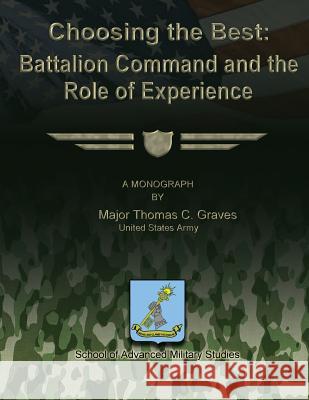Choosing the Best: Battalion Command and the Role of Experience » książka
Choosing the Best: Battalion Command and the Role of Experience
ISBN-13: 9781479364510 / Angielski / Miękka / 2012 / 66 str.
Experiential theorists have studies the role that experience plays in decision making in a naturalistic environment. This monograph takes that evidence and applies it to tactical situations. Specifically, the monograph studies how experience is gained in the United States Army at the tactical level prior to an officer assuming battalion command. The monograph includes an in depth study of how battalion command has increased in complexity since World War II. It shows a trend towards increasing complexity and difficulty throughout the last fifty years. Given this information, the monograph also studies how the Army has ensured that battalion commanders are prepared to assume their duties in this increasingly complex environment. The monograph attempts to determine whether an actual amount of time is required in key and critical jobs, rated as "branch qualifying" positions. The conclusions that the author reaches are that there is no specified amount of time that can be placed on how long an officer should occupy key positions to prepare him for battalion command. In spite of this, the monograph shows that there has been no concerted effort to increase the amount of tactical experience that officers receive prior to battalion command. Studying all of the information on career guidance over the past thirty years, this monograph shows that career management and guidance has not fundamentally changed to maintain pace with the increasing complexity of battalion command. The monograph ends with recommending that the career field designation board, currently used in the present model for officer career development, be executed at the fifth year in service, versus the eleventh year in service. This would allow officers to maintain a tactical focus for their entire career, leading up to the time that the officer assumes command of a battalion.
Zawartość książki może nie spełniać oczekiwań – reklamacje nie obejmują treści, która mogła nie być redakcyjnie ani merytorycznie opracowana.











